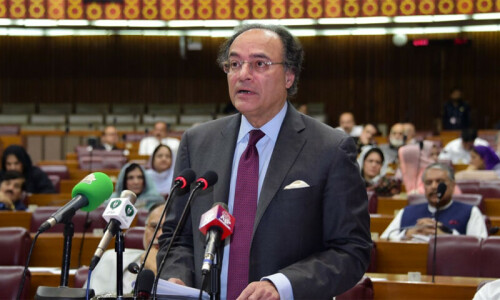AMID rising cost of living and growing financial stress, the country’s annual budget for the just-started fiscal year has left ordinary citizens struggling to make ends meet. From the classroom to the construction site, every sector has been slapped with more taxes.
The amended finance bill, recently approved by the National Assembly, has withdrawn tax exemptions on various sectors, causing prices to go through the roof. While the proposed bill suggested a 10 per cent sales tax on books and stationery items, the amended version exempted books but still left families burdened by the cost of other school supplies.
“It’s becoming impossible to live here,” says Zeeshan, a local resident. “The price of loose milk has crossed Rs200. All essential commodities have increased in price. The rising electricity, gas and fuel costs have forced me to use a bike instead of a car.”
For many, the most shocking changes came in the form of taxes on corporate dairy farming and fuel. The dairy farming and processing sector, earlier exempted from additional taxes, now faces 18pc General Sales Tax, driving up the prices of milk and dairy products.
Economists term new budget fundamentally unjust, criticise govt for burdening salaried class, ignoring those outside tax net
The levy on petroleum products has been raised from Rs60 to Rs70 per litre, and this extra Rs10 will be added to the fuel prices sometime later this fiscal year, putting additional pressure on transportation costs.
The final bill also imposes a 10pc to 12pc tax on builders’ and developers’ profits. A Rs2 per kg tax on cement will significantly increase construction cost, making owning a home an unattainable dream for many.
A closer look at the budget reveals several direct and indirect taxes that disproportionately affect the lower and middle classes. The 10pc sales tax on stationery items — like notebooks, pencils, pens, ink, staplers, etc — has forced families to cut back on other essential expenses to afford their children’s education.
Additionally, the Federal Excise Duty on international travel has made it more expensive for those needing to travel for medical treatment or religious pilgrimages.
Taxing the taxed
Economic experts warn that the current tax strategy, which relies heavily on increasing taxes for those already within the tax net while neglecting broader tax reforms, is unsustainable.
“No sane voice can dispute that Pakistan urgently needs to improve its tax-to-GDP ratio,” says Dr Abid Qaiyum Suleri, an expert on political economy and sustainable development.
“In this context, the finance bill envisages some bold measures to improve this ratio. However, the effectiveness of taxation measures is not solely judged by the amount collected, as the quality of taxation — whether it is regressive or progressive — and the broadening of the tax base is equally crucial,” he explains.
He stresses that taxation should redistribute income, transferring wealth from the affluent to the underprivileged. The current budget, however, targets the salaried class while excluding more affluent segments, he says.
“This approach exacerbates income inequalities,” he says, highlighting the importance of clear communication from the government about the benefits funded by taxpayers’ money. “In the absence of it, the government may reduce its fiscal deficit, but it will increase trust deficit between citizens and the government,” he believes.
Lack of strategy
Dr Ijaz Nabi, an economist working as country director for the International Growth Centre, expresses disappointment with the budget, noting that it lacks a comprehensive strategy for long-term economic stabilisation.
“If we see the latest budget, it reflects that we have to bring economic stabilisation by putting our fiscal house in order. It is a good thing. But for this, we need a comprehensive strategy related to structural reforms leading to stabilisation. These reforms always help to end instability. But the budget, in this context, has no strategy,” he explains.
Dr Nabi criticises the light taxation of real estate and retail markets and the increased burden on the export sector, which is already struggling. “We were leading in the export-to-GDP ratio in the 90s. But the Afghan war, the financial aid and other changing factors forced people to invest in real estate and wholesale businesses instead of industry, manufacturing, etc,” he says, insisting that the export sector shouldn’t have been taxed since the situation is already unwell. He says the budget also misses the strategy on increasing agriculture produce and criticises the government for increasing electricity tariff instead of plugging massive power theft and technical losses (almost 25 to 30pc).
Talking to Dawn, economist Dr Sajid Amin describes the budget as unfair, stressing that despite being under an IMF programme, sectors like real estate, retail, and agriculture could have been taxed more effectively.
“This budget violates fundamentals of tax justice,” Dr Amin says and criticises the government for burdening the salaried class and existing taxpayers, ignoring those outside the tax net.
He believes the budget will heap more misery on common, as the expanding scope of GST will lead to inflation. “The entire focus of the budget is on stability. Therefore, it is an IMF budget and not for the common person,” he says, predicting that inflation will surge to 18pc in the coming days due to rising energy prices.
Published in Dawn, July 8th, 2024













































Dear visitor, the comments section is undergoing an overhaul and will return soon.